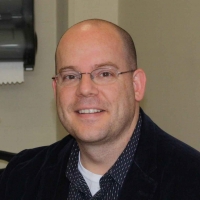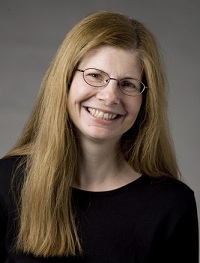SICB Annual Meeting 2013
January 3-7, 2013
San Francisco, CA
Hilton San Francisco Union Square
Teaching and Learning Roundtable: Vision and Change in Introductory Biology

Bram Lutton
The Educational Council will host its first annual “Teaching and Learning X” (TAL-X) roundtable discussion in San Francisco. The goal of these roundtables will be to take advantage of the broad teaching expertise within SICB by giving instructors a forum to share their most innovative ideas for teaching in their disciplines. Each year’s topic will be chosen from competing proposals and the roundtable will be facilitated by the Educational Council. Our topic for 2013, “Teaching and Learning: Vision and Change in Introductory Biology,” will involve luminaries from the field, including Susan Singer of Carleton College, our 2013 Moore Lecturer. This workshop is being organized by Dr. Bram Lutton of Endicott College based on his participation in the Vision and Change conference on introductory biology in summer 2012. More information about that conference is at http://ibp.ou.edu/; stay tuned for more information about the roundtable. We look forward to having you participate in TAL-IB!
Aims: This workshop will…
- Serve as a launching point toward future Teaching and Learning
(TAL) workshops,
progressing toward a greater depth of understanding for how to help
science, technology, engineering and math (STEM) students learn most
effectively.
- Determine the needs of SICB members with respect to the following: understanding
new teaching strategies that have been developed for STEM classrooms
(specifically Introductory Biology), implementation of novel methods in the classroom, engaging
academic administrators so that they understand and support utilization of new approaches.

Susan Singer
- Address misconceptions associated with several key topics (see below)
for improving STEM teaching and learning to assist with implementation
of new teaching methods (in particular for this TAL workshop,
Intro Bio).
- Develop a report for Integrative
and Comparative Biology and science education journals describing what is accomplished
with the TAL-Introductory Biology workshop. Include the role of SICB (in the context of
societies in general) toward implementing improved STEM learning strategies.
Workshop Plan
Welcome: (Dr. Bob Podolsky, College of Charleston)
Introduction and Breakout Sessions: (Dr. Bram Lutton, Endicott College)
- AAAS Vision
and Change Core Competencies and our national objectives for
STEM education. - Discussion
of key topics and misconceptions in Scientific Teaching.
Intended outcomes:
- Describe and discuss specific examples of misconceptions about scientific teaching and student learning in biology that can be used to motivate other faculty and administrators to consider adopting and encouraging new teaching strategies on your campus.
Conclusion (Dr. Susan Singer, Carleton College) – SICB 2013 Moore Lecturer
Key Topics in Scientific Thinking and the misconceptions that
accompany them
Modified from Handelsman et al., Scientific Teaching, 2007.
- Scientific Teaching
Definition: Teaching science courses in a way that represents
the true nature of science (i.e., utilizes the Scientific Method) and
approaches teaching with the same rigor as scientific research.
Common Misconceptions to address in Breakout Session:
- Scientific teaching requires extensive understanding of educational
literature and assessment techniques. - “If I‘m not lecturing, then I am not teaching.“
- Active Learning
Definition: the process in which students are actively engaged
in self-directed (individual and team-based) learning strategies in
the classroom.
Common Misconceptions to address in Breakout Session:
- Active learning takes too much time (for the professor and/or
for the students) and occurs at the expense of learning content; content
must be covered at all costs and other goals are secondary or irrelevant. - If students are not taking notes, then they are not learning.
- Assessment
Definition: measuring progress toward an achievement of the learning goals
via utilization of both formative and summative methods.
Common Misconceptions to address in Breakout Session:
- The point of assessment is not to help students learn but rather to
measure what they have learned. - I don‘t have a background in assessment needed for “scientific teaching.“
- Diversity
Definition: the characteristics that make each student unique,
each cohort of students unique, and each teaching experience unique.
Includes everything in the classroom: the students, the instructors,
the content, the teaching methods, and the context.
Common Misconceptions to address in Breakout Session:
- Students should be self-motivated to learn; it is the students’
job to achieve, not mine. - All Intro Bio students need to learn the same material in the
same way for consistency.
- Institutional Transformation
Definition: the process of changing the culture of a campus
to reflect a commitment to – and practices aimed at – improving
undergraduate science education.
Common Misconceptions to address in Breakout Session:
- There are too few people with too little time to make real change
at this campus. - Teaching accomplishments don‘t matter on my campus.
Acknowledgments
We would like to thank the Society for Integrative and Comparative Biology for approval and financial support for the annual Teaching and Learning workshops. We would also like to thank Dr. Jay Labov and Dr. Susan Singer for their support in the organization of this workshop.


